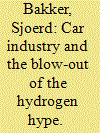| Srl | Item |
| 1 |
ID:
099230


|
|
|
|
|
| Publication |
2010.
|
| Summary/Abstract |
The hydrogen hype of the last decade has passed and it is now seemingly substituted by the electric vehicle hype. A technological hype can have both positive as well as negative consequences. On the one hand it attracts sponsors for technology development but on the other hand the high expectations might result in disappointment and subsequent withdrawal of the sponsors. In this paper I ask the question to what extent the car industry has created the hype and how it has done so. The industry's role is studied through their prototyping activities and accompanying statements on market entry. I conclude that the car industry has indeed inflated the hype, especially through its public statements on market release after the turn of the millennium. Furthermore, it can be concluded that the industry has shown a double repertoire of both highly optimistic and more modest statements. It is possible that statements are used deliberately to serve the industry's interests whenever needed. Without neglecting the positive influence of technological hype on public policy and private funding for R&D efforts, more modest promises could serve the development of sustainable mobility better. For policy makers the challenge is to remain open to different options instead of following hypes and disappointments as they come and go.
|
|
|
|
|
|
|
|
|
|
|
|
|
|
|
|
| 2 |
ID:
133088


|
|
|
|
|
| Publication |
2014.
|
| Summary/Abstract |
Electric vehicles represent an innovation with the potential to lower greenhouse gas emissions and help mitigate the causes of climate change. However, externalities including the appropriability of knowledge and pollution abatement result in societal/economic benefits that are not incorporated in electric vehicle prices. In order to address resulting market failures, governments have employed a number of policies. We seek to determine the relationship of one such policy instrument (consumer financial incentives) to electric vehicle adoption. Based on existing literature, we identified several additional socio-economic factors that are expected to be influential in determining electric vehicle adoption rates. Using multiple linear regression analysis, we examined the relationship between those variables and 30 national electric vehicle market shares for the year 2012. The model found financial incentives, charging infrastructure, and local presence of production facilities to be significant and positively correlated to a country×s electric vehicle market share. Results suggest that of those factors, charging infrastructure was most strongly related to electric vehicle adoption. However, descriptive analysis suggests that neither financial incentives nor charging infrastructure ensure high electric vehicle adoption rates.
|
|
|
|
|
|
|
|
|
|
|
|
|
|
|
|